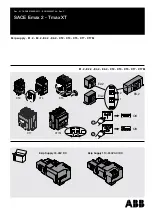
56
c)
Fix Det_Holder_22 on the CBdet_Shaft_1 with StandDet_Bolt_DIN933(M6_20_Fe88-Zn)
Figure 96
Interlocking lever assembly design for three phase ISM
An electrical interlock can be provided by connecting the ISM actuator coil in series with the contacts of a
position switch of the relevant device (disconnector or draw-out truck, etc.) as shown in the Figure 97.
AC
— actuator coil;
PS
— position switch with
current not less than 10 A;
R
— resistor 22 kOhm±5%,
average power 0.15 W, peak
power 8 W
Figure 97
Electrical interlock diagram
The position switch must be positively driven in both directions and must fully operate before the interlocked
ISM starts to move to
its alternative position. Resistor ‚R‘ is used to prevent the CM alarm “Actuator Coil
Isolated“ while position switch PS is open.
ISM15_LD_8, MD_1, MD_3, SHELL_2, HD_1 interlocks
Interlocking mechanism
Each of ISM15_LD_8, MD_1, MD_3, SHELL_2, HD_1 is equipped with an interlocking shaft that can be rotated
clockwise to the “unlatched“ position or counter-clockwise to the “open and locked“ position. In the
“unlatched“ position the ISM can perform “close” and “open” operations.
In the “open and locked” position the ISM the interlocking shaft prevents the actuator mechanically from
closing. In addition the actuator coils are disconnected from the CM.
If the ISM is closed, rotation of the interlocking shaft from “unlatched” to “open and locked” position leads to
manual tripping. The CM indicates alarm “Manual Trip”.
The interlocking shaft of ISM15_Shell is fi
xed in the „open and locked“ position. To return it in the
„unlatched“ position the opposite direction force shall be applied to the shaft as shown in the Figure 100. The
interlocking shafts of ISM15_LD_8, MD_1, MD_3,HD_1 are not fi
xed in the „open and locked“ position since
these ISMs have shaft return spring that returns
them back to the „unlatched“ position. To leave their shafts in
the „open and locked“ position the external force shall be applied to the shaft to hold it in this position as shown
in the Figure 100.
Summary of Contents for VCB Series
Page 1: ...COMPATIBLE SERIES USER GUIDE...
Page 2: ......
Page 4: ......
Page 5: ...1 Product description...
Page 13: ...13 2 Nameplates and seals...
Page 18: ...18 3 Product handling...
Page 37: ...4 Installation...
Page 87: ......
Page 88: ...5 Commissioning...
Page 94: ...94 Figure 155 The connection points of the contact resistance meter...
Page 95: ......
Page 96: ...6 Operation...
Page 100: ...7 Maintenance and troubleshooting...
Page 105: ......
Page 106: ...8 Disposal...
Page 109: ...109 Appendix 2 Overall Drawings...
Page 112: ...112 ISM15_LD_3 Weight 13 kg ISM15_LD_6 PCD 133 mm Weight 55 kg...
Page 113: ...113 ISM15_LD_8 PCD 210 mm Weight 26 kg...
Page 114: ...114 ISM15_MD_1 150_L PCD 150 mm Weight 33 kg ISM15_MD_1 210_L PCD 210 mm Weight 35 kg...
Page 115: ...115 ISM15_MD_3 Weight 13 kg ISM15_Shell_2 150_L PCD 150 mm Weight 51 kg...
Page 120: ...120 ISM15_HD_1 275 PCD 275 mm Weight 72 kg ISM25_LD_1 210_Par2 PCD 210 mm Weight 36 kg...
Page 123: ...123 ISM25_LD_2 2 PCD 150 mm Weight 37 kg ISM25_LD_3 Weight 14 kg...
Page 125: ...125 Dimensions of Control Module CM_16_1 Par1_Par2_Par3_Par4_Par5 Weight 1 kg...
Page 127: ...127 Dimensions of Interlocking Kits CBkit_Interlock_1 CBkit_Interlock_3...
Page 128: ...128 CBkit_Interlock_4 CBkit_Interlock_5...
Page 129: ...Appendix 3 Secondary Schemes...
Page 130: ...130...
Page 131: ...131...
Page 132: ...132...
Page 133: ...133...
Page 134: ...134...
Page 135: ...135...
Page 136: ...136...
Page 137: ...137...
Page 138: ...138...
Page 139: ...139...
Page 140: ...140...
Page 142: ...Bartlett...














































